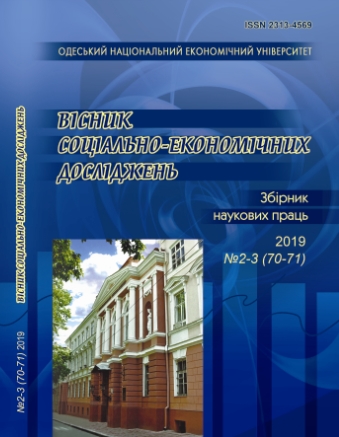The dialectic of rationality and economic efficiency: problems, attainments, possible solutions
DOI:
https://doi.org/10.33987/vsed.2-3(70-71).2019.9-19Keywords:
knowledge transformation, scientific rationality, economic efficiency, types of science, criteria, evaluation, selectionAbstract
The aim of article is to investigate the modern state of dialectic rationality and economic efficiency. The content of European culture key values without relying on which a person cannot think, learn and act fruitfully, are clarified. This applies to any field of activity: economic, social, political, etc. It is proved that in the economics sphere, rationality is usually characterized by the ability to organize the production process. She is measured by the expenditures required for manufacturing of production unit. It is illustrated that an economic system is considered rational if it operates with the lowest possible expenditure of energy and other resources, and operates on an approved program. The research results showed that rationality and efficiency in economic activity are usually dialectically interconnected and this relationship is contradictory: requirements for production efficiency increasing are constantly ahead of the possibilities for changes in a more conservative rational structure of the system, which raises the contradiction between them. It is proved that it is problematic to achieve a coincidence in time of the optimal level of functioning of the economic system both in a rational plan and in terms of its proper efficiency ensuring, and in the long term. A conceptual approach to the problems further research is proposed, the essence of which is not ignoring the place and role of classical rationality in the modern history of European science and philosophy, but, on the contrary, a more thorough search and use of all the positive that this type of rationality gave for the development of economic science, a fundamental study it’s still unknown heritage and deep understanding of it – all this should remain one of the priority directions of scientific and philosophical research.
References
Avtonomova, N. S. (1995). Rationality: science, philosophy, life [Ratsionalnost: nauka, filosofiya, zhizn], Ratsionalnost kak predmet fylosofskogo issledovaniya, Moskva: IF RAN, available at: http://www.adhdportal.com/book_2819_chapter_5_N.S.Avtonomova_Raionalnost:_nauka,_filosofija,_z hizn.html [in Russian]
Porus, V. N. (2010). Rationality. New Philosophical Encyclopedia: in 4 vol. Eds. V. S. Stepyn, A. Guseynov, G. Yu. Semygyn et al. [Ratsionalnost. Novaya filosofskaya entsyklopediya: v 4 t.; Nauchno-red. sovet: V. S. Stepyn, A. Guseynov, G. Yu. Semygyn i dr.], Institut filosofii RAN, Natsionalnyy obshch.-nauch. fond, Mysl, Moskva, T. 3, 640 s. [in Russian]
Zlotina, M. L. (1980). Dialectical laws of development as a worldview principles of creative activity [Dialekticheskie zakony razvitiya kak mirovozzrencheskie printsypy tvorcheskoy deyatelnosti], Praktika – poznanie – myrovozzrenie, Naukova dumka, Kiev, s. 225 [in Russian]
Kasavyn, I. T., Lektorskiy, V. A., Shvyrev, V. S. (2005). Rationality as a cultural value [Ratsionalnost kak tsennost kultury], Vestnik Rossiyskoy Akademiy Nauk, T. 75, No. 11, s. 1028–1037 [in Russian]
Dictionary of Philosophical Terms (2013). Ed. by V. G. Kuznetsov [Slovar filosofskikh terminov; nauch. red. V. G. Kuznetsova], INFRA-M, Moskva, s. 256 [in Russian]
Tulchynskiy, G. L. (1999). Two types of rationality [Dva tipa ratsionalnosti], Kosmizm i novoe myshlenie na Zapade i Vostoke, Sankt-Peterburg, available at: http://hpsy.ru/public/x3145.htm [in Russian]
Arshynov, V. I. (2010). Synergetics. New Philosophical Encyclopedia: in 4 vol. Eds. V. S. Stepin, A. A. Guseynov, G. Yu. Semigin et al. [Sinergetika. Novaya filosofskaya entsiklopediya: v 4 t.; Nauchno-red. sovet: V. S. Stepyn, A. A. Guseynov, G. Yu. Semigin i dr.], Institut filosofii RAN, Nats. obshch.-nauch. fond, Mysl, Moskva, T. 3, s. 546 [in Russian]
Lenk, H. (1996). Reflections on modern technology. Trans. from Germ. V. S. Stepin, V. G. Gorokhov, [Razmyshleniya o sovremennoy tekhnike; per. s nem. V. S. Stepina, V. G. Gorokhova], Gumanitarnye tekhnologii, Analiticheskiy portal, Moskva, available at: https://gtmarket.ru/laboratory/basis/6037 [in Russian]
Sydorenko, O. P., Korliuk, S. S., Vlasov, V. V., Rozova, T. V. et al. (2017). Propedeutical course in philosophy of science. Ed. by O. P. Sydorenko [Propedevtychnyi kurs z filosofii nauki; za red. O. P. Sydorenka], Kyiv, Osvita Ukrainy, s. 313–317 [in Ukrainian]
Lektorskiy, V. A. (2010). Consciousness. New Philosophical Encyclopedia: in 4 vol. Eds. V. S. Stepin, A. A. Guseynov, G. Yu. Semigin et al. [Soznanie. Novaya filosofskaya entsyklopediya: v 4 t.; Nauch.-red. sovet: V. S. Stepin, A. A. Guseynov, G. Yu. Semigin i dr.], Institut filosofii RAN, Nats. obshch.-nauch. fond, Mysl, 2010, Moskva, s. 589 [in Russian]
Downloads
Published
Issue
Section
License
Copyright (c) 2019 Socio-Economic Research Bulletin

This work is licensed under a Creative Commons Attribution 4.0 International License.






